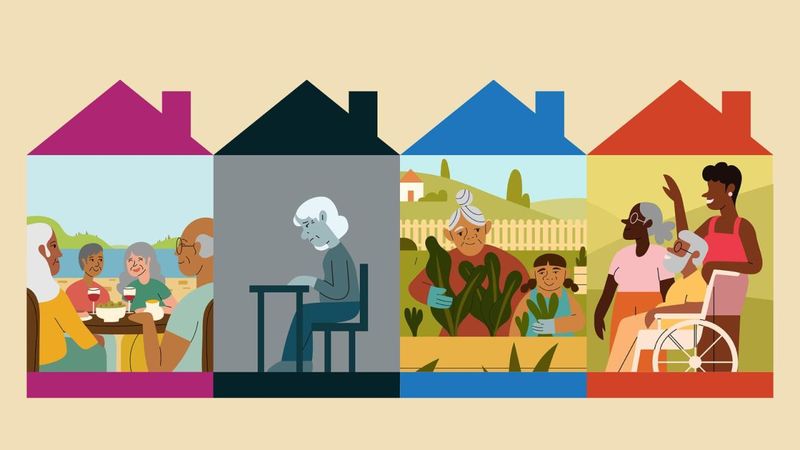As people age, they often find their patience wearing thinner, not only with others but sometimes even with themselves. Understanding the reasons behind this shift can provide insight and empathy towards the elderly in our lives. Here’s a look at the factors contributing to this phenomenon.
1. Increased Life Experience

With a wealth of life experiences, older individuals often have little tolerance for what they perceive as unnecessary drama. Over time, they’ve learned what truly matters and are less inclined to indulge in trivial disputes. They prioritize meaningful interactions and are quick to dismiss what doesn’t serve their well-being.
Moreover, having faced countless challenges, they recognize patterns and foresee outcomes, leading to impatience with recurring mistakes. This foresight, while valuable, can make them less forgiving.
Ultimately, their rich experiences shape a perspective that values time and energy, making them more discerning in their interactions.
2. Physical and Mental Changes

Aging brings both physical and mental changes that can affect patience levels. Physical discomfort, such as joint pain or hearing loss, can make interactions more challenging, leading to irritation. These discomforts often act as constant reminders of limitations.
Additionally, cognitive shifts can impact how quickly and effectively they process information, sometimes causing frustration in fast-paced conversations. A once sharp mind may now struggle to keep up, breeding impatience.
Recognizing these changes helps in understanding why seniors might appear less patient, as they navigate daily challenges with resilience.
3. Value of Time

Time becomes increasingly precious as people age, leading to impatience with unproductive endeavors. They recognize that their time is finite, making them more selective about how they spend it.
Older adults often seek efficiency in tasks and conversations, and may become frustrated with delays or misunderstandings. Their desire to make the most of their remaining years drives them to focus on what truly matters.
This heightened awareness of time’s value can lead to impatience, but also a deeper appreciation for meaningful moments.
4. Technological Advancements

Rapid technological advancements can leave older adults feeling alienated and frustrated. With technology evolving faster than ever, keeping pace becomes challenging for many.
The complexity of new gadgets and apps can be overwhelming, leading to impatience as they attempt to adapt to the digital age. This frustration is often compounded by the knowledge that younger generations easily navigate these changes.
While some embrace technology, others find it a source of stress and impatience, particularly when faced with the need to constantly learn new systems.
5. Simplified Social Networks

As people age, their social networks often become smaller and more selective. They prefer the company of those who truly understand and appreciate them, leading to impatience with superficial relationships.
The desire for genuine connections over quantity causes them to distance themselves from less meaningful interactions. This shift often results in a reluctance to invest time in building new relationships.
With a focus on quality over quantity, older individuals prioritize deep bonds, valuing trust and understanding, which may manifest as impatience with trivial social engagements.
6. Heightened Self-Awareness

With age comes a heightened self-awareness that can influence patience levels. Older individuals often have a clearer understanding of their strengths and limitations, and this self-knowledge can make them less tolerant of others’ shortcomings.
They’ve spent years refining who they are, and this clarity can lead to impatience with those who lack self-awareness or direction.
While this self-awareness fosters personal growth, it can sometimes create a barrier to empathy, making it challenging to overlook others’ faults, thus affecting patience.
7. Cultural and Generational Gaps

Cultural and generational gaps often contribute to impatience among older individuals. As society evolves, values and norms shift, sometimes clashing with deeply ingrained beliefs.
These differences can lead to frustration, especially when older adults feel their perspectives are misunderstood or dismissed by younger generations.
Navigating these gaps requires patience, yet the challenge of bridging differing viewpoints can exhaust even the most tolerant. Understanding and bridging these gaps is key to fostering intergenerational harmony and patience.
8. Accumulated Responsibilities

With age comes a lifetime of accumulated responsibilities, which can strain patience. Balancing family, finances, health, and personal interests demands energy and resilience.
The weight of these responsibilities can lead to impatience, as older individuals juggle multiple priorities. They often experience pressure to maintain stability for themselves and loved ones.
This ongoing balancing act requires constant adaptation, which can be both rewarding and exhausting, testing patience in various aspects of life.
9. Reduced Tolerance for Incompetence

As people age, they may develop a reduced tolerance for incompetence. Having dealt with a myriad of situations, they recognize inefficiencies and have little patience for them.
This intolerance is often a result of knowing how things should be done and becoming frustrated when others fail to meet those expectations.
Their experience cultivates a desire for competency, making them less forgiving of poor service or inefficiency. This expectation for professionalism can lead to impatience in daily interactions.
10. Emotional and Cognitive Changes

Aging brings emotional and cognitive changes that can influence patience. Emotional depth often grows with age, leading to a richer, yet more complex emotional landscape.
These changes can make older adults more sensitive to emotional disturbances, impacting how they respond to stress and frustration. The mental agility required to adapt to new situations may decrease, causing impatience.
However, these emotional changes also foster empathy and understanding, offering a nuanced view of patience and impatience.
Hi all, I am Sidney, an accountant, a hobbyist photographer, and a mother to two sweet girls who are my motivation. I love sharing the tips and tricks I gained all these years I’ve been a mother. I hope it will help you!

